24th October 2009 - New research
GAUCHER'S DISEASE AND
PARKINSON'S DISEASE
New England Journal of Medicine
[2009] 361 (17) : 1651-1661
(Sidransky et al)
Complete abstract
Gaucher's Disease has been found to make Parkinson's Disease five times more
likely. Gaucher's Disease is an inherited metabolic disorder in which
harmful quantities of a substance called
glucocerebroside can accumulate in the spleen, liver, lungs, bone marrow,
and the brain. Glucocerebroside accumulates
because
glucocerebrosidase
(the
chemical that breaks it down) is deficient in Gaucher's Disease.
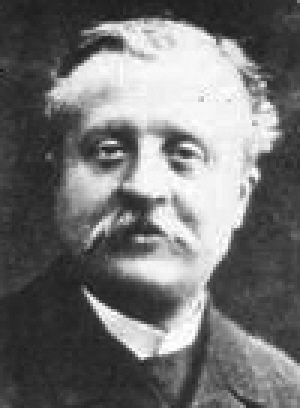 It is
named after the French doctor Philippe Gaucher, who originally described it. For
more information go to
Gaucher's Disease. A lot of people are
carriers for Gaucher's Disease without realising it. Around 1 in 100 people are
a carrier for Gaucher's Disease. In Ashkenazi Jews as many as 1 in 15 are a
carrier. Those people that had Gaucher's Disease and
Parkinson's Disease developed Parkinson's Disease at an earlier age, were more
likely to have affected relatives, and were more likely to have atypical
clinical manifestations. Although it is known what causes Gaucher's Disease,
it is not known how that can also cause the symptoms of Parkinson's Disease.
In order to refer to this article on its own
click here.
It is
named after the French doctor Philippe Gaucher, who originally described it. For
more information go to
Gaucher's Disease. A lot of people are
carriers for Gaucher's Disease without realising it. Around 1 in 100 people are
a carrier for Gaucher's Disease. In Ashkenazi Jews as many as 1 in 15 are a
carrier. Those people that had Gaucher's Disease and
Parkinson's Disease developed Parkinson's Disease at an earlier age, were more
likely to have affected relatives, and were more likely to have atypical
clinical manifestations. Although it is known what causes Gaucher's Disease,
it is not known how that can also cause the symptoms of Parkinson's Disease.
In order to refer to this article on its own
click here.
23rd October 2009 - New book
DEEP WITHIN THE BRAIN : LIVING WITH PARKINSON'S DISEASE
Helmut Dubiel, Hubert H.
Fernandez
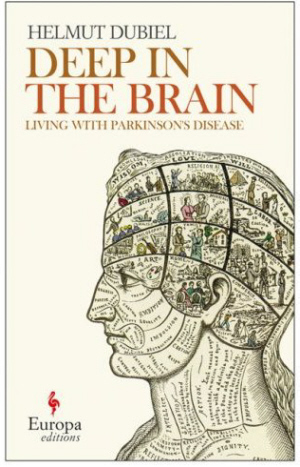 Publisher's
description : At the age of forty-six, philosopher and university professor
Helmut Dubiel was diagnosed with Parkinson's disease. In the early stages of his
sickness, fearing censure and ostracism, Dubiel did his utmost to conceal his
condition. But when his symptoms became too obvious to camouflage, he was
obliged to admit defeat and decided to
undergo deep brain stimulation surgery. In this fascinating book, Dubiel
describes his illness with a philosopher's aplomb, ennobling his
personal experience with flair and scientific insight as he makes
connections between his own medical drama and some of today's most significant tendencies.
Click here for more details. For more books concerning Parkinson's Disease go to
Parkinson's
Disease Books.
Publisher's
description : At the age of forty-six, philosopher and university professor
Helmut Dubiel was diagnosed with Parkinson's disease. In the early stages of his
sickness, fearing censure and ostracism, Dubiel did his utmost to conceal his
condition. But when his symptoms became too obvious to camouflage, he was
obliged to admit defeat and decided to
undergo deep brain stimulation surgery. In this fascinating book, Dubiel
describes his illness with a philosopher's aplomb, ennobling his
personal experience with flair and scientific insight as he makes
connections between his own medical drama and some of today's most significant tendencies.
Click here for more details. For more books concerning Parkinson's Disease go to
Parkinson's
Disease Books.
19th October 2009 - New research
THE EFFECT OF MAO
INHIBITORS ON PARKINSON'S DISEASE
Cochrane Database
of systematic reviews [2009] 4 : CD006661 (R.Caslake,
A.Macleod, N.Ives, R.Stowe, C.Counsell)
Complete abstract
Researchers compared the effect of MAO-B inhibitors on Parkinson's Disease with
the use of dopaminergic drugs. MAO-B inhibitors that are commonly used with
Parkinson's Disease are Selegiline (Deprenyl) and Rasagiline (Azilect). MAO-B
inhibitors help to sustain the levels of dopamine. For more information go to
MAO inhibitors.
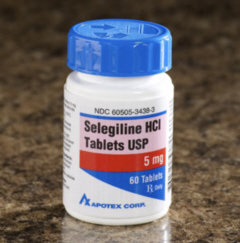 Those
people taking MAO-B inhibitors were far more likely to require additional
treatments than those taking L-dopa or dopamine agonists. MAO-B inhibitors were
sufficient on their own in very few people. MAO-B inhibitors caused far fewer
motor fluctuations than L-dopa, but a bit more than dopamine agonists.
Withdrawals due to adverse events were far less common with MAO-B inhibitors
than with dopamine agonists. The authors concluded that MAO-B inhibitors are one
option for the early treatment of Parkinson's Disease, but that they have weaker
effects than L-dopa and dopamine agonists.
In order to refer to this article on its own
click here.
Those
people taking MAO-B inhibitors were far more likely to require additional
treatments than those taking L-dopa or dopamine agonists. MAO-B inhibitors were
sufficient on their own in very few people. MAO-B inhibitors caused far fewer
motor fluctuations than L-dopa, but a bit more than dopamine agonists.
Withdrawals due to adverse events were far less common with MAO-B inhibitors
than with dopamine agonists. The authors concluded that MAO-B inhibitors are one
option for the early treatment of Parkinson's Disease, but that they have weaker
effects than L-dopa and dopamine agonists.
In order to refer to this article on its own
click here.
15th October 2009 - News release
THE EFFECT OF COGANE ON PARKINSON'S DISEASE
Phytopharm have claimed that Cogane has
reversed the effects of Parkinson's Disease.
However, the study did not measure the long term effects, and the full details
of the clinical trial have not been made available for analysis.
For more information go to their
News release.
Cogane, which can be taken orally, readily crosses the blood-brain barrier and
has been shown to stimulate the release of GDNF. GDNF can indirectly stimulate
the formation of
dopamine,
the substance whose insufficiency causes Parkinson's Disease. For more
information go to
Cogane.
 However, GDNF deficiency has never been shown to be the cause of Parkinson's
Disease. GDNF was found to be ineffective in clinical trials in humans. Although
Phytopharm claim that Cogane can reverse the effects of Parkinson's Disease,
Cogane has never reversed the effects of Parkinson's Disease in anyone. The
efficacy study was only carried out on Macaque monkeys. Macaque monkeys do not
have Parkinson's Disease. What is described as Parkinson's Disease in monkeys is
usually only drug induced. In order to refer to this
article on its own
click here.
However, GDNF deficiency has never been shown to be the cause of Parkinson's
Disease. GDNF was found to be ineffective in clinical trials in humans. Although
Phytopharm claim that Cogane can reverse the effects of Parkinson's Disease,
Cogane has never reversed the effects of Parkinson's Disease in anyone. The
efficacy study was only carried out on Macaque monkeys. Macaque monkeys do not
have Parkinson's Disease. What is described as Parkinson's Disease in monkeys is
usually only drug induced. In order to refer to this
article on its own
click here.
14th October 2009 - News report
AGENT ORANGE ACCEPTED
AS A CAUSE OF PARKINSON'S DISEASE
The U.S. Department of Veterans Affairs has acknowledged Agent Orange as a
cause of Parkinson's Disease.
For more information go to the
News report.
Agent Orange is the
name given to a herbicide used by the U.S. Military during the Vietnam War
as a means of warfare. For more information go to
Agent Orange. In practical terms, those Veterans who served in the
Vietnam War and who have Parkinson's Disease will not have to prove an
association between their Parkinson's Disease and their military service in
Vietnam. This acknowledgement simplifies and speeds up any application they make
for benefits. For their web site go to the
U.S. Department of Veteran Affairs.
 Their
acknowledgement of an association is based entirely on
the "Veterans and Agent Orange Update
2008", which can be
read
here.
Although the report claims to "link" Agent Orange to Parkinson's Disease, it
fails to provide any evidence showing that Agent Orange had caused
Parkinson's Disease. There have been over
300 published studies on the effects of Agent Orange, yet none of
them have shown that Agent Orange has caused Parkinson's Disease.
Toxic exposure can not begin to have an
effect on Parkinson's Disease years or decades after toxic exposure as is often
claimed. It can occur in almost anyone without toxicity being the cause.
In order to refer to this
article on its own
click here.
Their
acknowledgement of an association is based entirely on
the "Veterans and Agent Orange Update
2008", which can be
read
here.
Although the report claims to "link" Agent Orange to Parkinson's Disease, it
fails to provide any evidence showing that Agent Orange had caused
Parkinson's Disease. There have been over
300 published studies on the effects of Agent Orange, yet none of
them have shown that Agent Orange has caused Parkinson's Disease.
Toxic exposure can not begin to have an
effect on Parkinson's Disease years or decades after toxic exposure as is often
claimed. It can occur in almost anyone without toxicity being the cause.
In order to refer to this
article on its own
click here.
11th October 2009 - New research
DUAL LAYER
L-DOPA FOR PARKINSON'S DISEASE
Clinical Neuropharmacology [2009] 32 (4) :
189-192 (Hinson VK, Goetz CG, Leurgans S, Fan W, Nguyen T, Hsu A.)
Complete abstract
IPX054, which is a form of L-dopa, in which there
are two layers, has been shown to be slightly more effective than conventional
forms of L-dopa, despite only having to be taken twice a day instead of
throughout the day. L-dopa usually comes in two different formats : either the
immediate release version, which satisfies the immediate need for
L-dopa, or the controlled release version, which
avoids the excessive effects of L-dopa by spreading out the effect
 over
time. IPX054 combines the two types of L-dopa, immediate release and controlled
release, in one tablet, in two different layers, aiming to provide the benefits
of both formats. In clinical practice, this ease of administration may offer
improved treatment compliance and effectiveness.
In order to refer to this
article on its own
click here.
over
time. IPX054 combines the two types of L-dopa, immediate release and controlled
release, in one tablet, in two different layers, aiming to provide the benefits
of both formats. In clinical practice, this ease of administration may offer
improved treatment compliance and effectiveness.
In order to refer to this
article on its own
click here.
7th
October 2009 - News release
MAGNETIC THERAPY FOR PARKINSON'S DISEASE
Pico-Tesla claim to have
shown �significant improvement over placebo� in reducing Parkinson�s
disease symptoms using their magnetic therapy Magneceutical, that persisted for
up to two months after treatment without side effects.
The
level of improvement was not disclosed.
For more information read
the
News release.
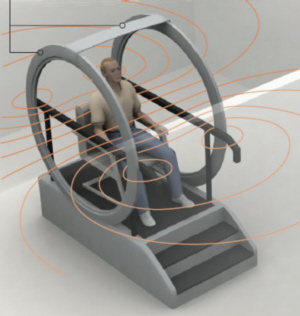 Magneceutical Therapy
involves the use of an extremely low-level electromagnetic field applied by a
specially designed device, the Resonator, along with proprietary therapeutic
protocols, intended to improve a number of the signs and symptoms of Parkinson�s
and other neurological disorders. Helmholtz coils immerse the entire patient in
a low strength electromagnetic field. The strength and duration of the magnetic
fields are regulated by Pico-Tesla via the internet. The mechanism of action of
magnetic therapy is not known. For more information concerning the method
used go to
The Resonator.
In order to refer to this article
on its own
click here.
Magneceutical Therapy
involves the use of an extremely low-level electromagnetic field applied by a
specially designed device, the Resonator, along with proprietary therapeutic
protocols, intended to improve a number of the signs and symptoms of Parkinson�s
and other neurological disorders. Helmholtz coils immerse the entire patient in
a low strength electromagnetic field. The strength and duration of the magnetic
fields are regulated by Pico-Tesla via the internet. The mechanism of action of
magnetic therapy is not known. For more information concerning the method
used go to
The Resonator.
In order to refer to this article
on its own
click here.
5th October
2009 - New research
L-SULPIRIDE AS A CAUSE OF
PARKINSON'S DISEASE
Movement Disorders [2009]
Sep 30 [Epub ahead of print] (Shin HW, Kim MJ, Kim JS, Lee MC, Chung SJ.)
Complete abstract
The drug L-Sulpiride has been found to commonly cause the symptoms of
Parkinson's Disease.
Levosulpiride is widely used for the management
of
Dyspeptic
Syndrome, Retarded Gastric Excretion, Vertigo, Vomiting And Nausea.
For more information go to
L-Sulpiride. Little
was known about L-Sulpiride-induced movement disorders
(LIM).
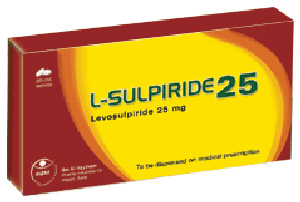 So the aim of this study was to investigate the clinical characteristics of
patients with L-Sulpiride-induced movement disorders (LIM). The most common
L-Sulpiride-induced movement disorder was Parkinsonism making up over 90% of cases,
followed by tardive dyskinesia with about 10% of cases, and isolated tremor
affecting only 3% of cases.
The symptoms are often severe, and
L-Sulpiride-induced movement disorders still persisted even after
withdrawal of L-Sulpiride in nearly half of those patients with L-Sulpiride induced
Parkinsonism.
In order to refer to this article
on its own
click here.
So the aim of this study was to investigate the clinical characteristics of
patients with L-Sulpiride-induced movement disorders (LIM). The most common
L-Sulpiride-induced movement disorder was Parkinsonism making up over 90% of cases,
followed by tardive dyskinesia with about 10% of cases, and isolated tremor
affecting only 3% of cases.
The symptoms are often severe, and
L-Sulpiride-induced movement disorders still persisted even after
withdrawal of L-Sulpiride in nearly half of those patients with L-Sulpiride induced
Parkinsonism.
In order to refer to this article
on its own
click here.
1st October 2009 - New research
THE EFFECT OF RASAGILINE ON
PARKINSON'S DISEASE
New England Journal of
Medicine [2009] 361 (13) : 1268-1278 (Olanow CW, et al)
Complete abstract
Claims based on the
results of a recent clinical trial that Rasagiline (Azilect) slows the
progression of Parkinson's Disease are not supported at all by that study's
results. Yet it has still been very widely, and falsely claimed that Rasagiline
slows the progression of Parkinson's Disease. Rasagiline is a MAO inhibitor,
which is a type of drug that is often used in Parkinson's Disease alone, or
alongside other treatments.
For more information go to
Rasagiline.
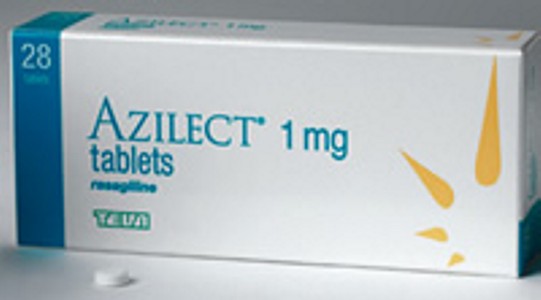 The clinical trial involved over a thousand patients.
In early-start treatment
with Rasagiline at a dose of 1 mg per day, there was actually a worsening of
Parkinson's Disease symptoms throughout the clinical trial. As time progressed
during the clinical trial, the effect of 1mg Rasagiline was found to be
no different from those people that had taken Rasagiline for only half of the
time. The use of 2mg Rasagiline per day was also shown to be no better than the
use of 1mg or delaying the use of Rasagiline.
In order to refer to this article
on its own
click here.
The clinical trial involved over a thousand patients.
In early-start treatment
with Rasagiline at a dose of 1 mg per day, there was actually a worsening of
Parkinson's Disease symptoms throughout the clinical trial. As time progressed
during the clinical trial, the effect of 1mg Rasagiline was found to be
no different from those people that had taken Rasagiline for only half of the
time. The use of 2mg Rasagiline per day was also shown to be no better than the
use of 1mg or delaying the use of Rasagiline.
In order to refer to this article
on its own
click here.
.gif)
.gif)
 It is
named after the French doctor Philippe Gaucher, who originally described it. For
more information go to
It is
named after the French doctor Philippe Gaucher, who originally described it. For
more information go to
 Publisher's
description : At the age of forty-six, philosopher and university professor
Helmut Dubiel was diagnosed with Parkinson's disease. In the early stages of his
sickness, fearing censure and ostracism, Dubiel did his utmost to conceal his
condition. But when his symptoms became too obvious to camouflage, he was
obliged to admit defeat and decided to
undergo deep brain stimulation surgery. In this fascinating book, Dubiel
describes his illness with a philosopher's aplomb, ennobling his
personal experience with flair and scientific insight as he makes
connections between his own medical drama and some of today's most significant tendencies.
Publisher's
description : At the age of forty-six, philosopher and university professor
Helmut Dubiel was diagnosed with Parkinson's disease. In the early stages of his
sickness, fearing censure and ostracism, Dubiel did his utmost to conceal his
condition. But when his symptoms became too obvious to camouflage, he was
obliged to admit defeat and decided to
undergo deep brain stimulation surgery. In this fascinating book, Dubiel
describes his illness with a philosopher's aplomb, ennobling his
personal experience with flair and scientific insight as he makes
connections between his own medical drama and some of today's most significant tendencies.
 Those
people taking MAO-B inhibitors were far more likely to require additional
treatments than those taking L-dopa or dopamine agonists. MAO-B inhibitors were
sufficient on their own in very few people. MAO-B inhibitors caused far fewer
motor fluctuations than L-dopa, but a bit more than dopamine agonists.
Withdrawals due to adverse events were far less common with MAO-B inhibitors
than with dopamine agonists. The authors concluded that MAO-B inhibitors are one
option for the early treatment of Parkinson's Disease, but that they have weaker
effects than L-dopa and dopamine agonists.
In order to refer to this article on its own
Those
people taking MAO-B inhibitors were far more likely to require additional
treatments than those taking L-dopa or dopamine agonists. MAO-B inhibitors were
sufficient on their own in very few people. MAO-B inhibitors caused far fewer
motor fluctuations than L-dopa, but a bit more than dopamine agonists.
Withdrawals due to adverse events were far less common with MAO-B inhibitors
than with dopamine agonists. The authors concluded that MAO-B inhibitors are one
option for the early treatment of Parkinson's Disease, but that they have weaker
effects than L-dopa and dopamine agonists.
In order to refer to this article on its own
 However, GDNF deficiency has never been shown to be the cause of Parkinson's
Disease. GDNF was found to be ineffective in clinical trials in humans. Although
Phytopharm claim that Cogane can reverse the effects of Parkinson's Disease,
Cogane has never reversed the effects of Parkinson's Disease in anyone. The
efficacy study was only carried out on Macaque monkeys. Macaque monkeys do not
have Parkinson's Disease. What is described as Parkinson's Disease in monkeys is
usually only drug induced. In order to refer to this
article on its own
However, GDNF deficiency has never been shown to be the cause of Parkinson's
Disease. GDNF was found to be ineffective in clinical trials in humans. Although
Phytopharm claim that Cogane can reverse the effects of Parkinson's Disease,
Cogane has never reversed the effects of Parkinson's Disease in anyone. The
efficacy study was only carried out on Macaque monkeys. Macaque monkeys do not
have Parkinson's Disease. What is described as Parkinson's Disease in monkeys is
usually only drug induced. In order to refer to this
article on its own
 Their
acknowledgement of an association is based entirely on
the "Veterans and Agent Orange Update
2008", which can be
read
Their
acknowledgement of an association is based entirely on
the "Veterans and Agent Orange Update
2008", which can be
read
 over
time. IPX054 combines the two types of L-dopa, immediate release and controlled
release, in one tablet, in two different layers, aiming to provide the benefits
of both formats. In clinical practice, this ease of administration may offer
improved treatment compliance and effectiveness.
In order to refer to this
article on its own
over
time. IPX054 combines the two types of L-dopa, immediate release and controlled
release, in one tablet, in two different layers, aiming to provide the benefits
of both formats. In clinical practice, this ease of administration may offer
improved treatment compliance and effectiveness.
In order to refer to this
article on its own
 Magneceutical Therapy
involves the use of an extremely low-level electromagnetic field applied by a
specially designed device, the Resonator, along with proprietary therapeutic
protocols, intended to improve a number of the signs and symptoms of Parkinson�s
and other neurological disorders. Helmholtz coils immerse the entire patient in
a low strength electromagnetic field. The strength and duration of the magnetic
fields are regulated by Pico-Tesla via the internet. The mechanism of action of
magnetic therapy is not known. For more information concerning the method
used go to
Magneceutical Therapy
involves the use of an extremely low-level electromagnetic field applied by a
specially designed device, the Resonator, along with proprietary therapeutic
protocols, intended to improve a number of the signs and symptoms of Parkinson�s
and other neurological disorders. Helmholtz coils immerse the entire patient in
a low strength electromagnetic field. The strength and duration of the magnetic
fields are regulated by Pico-Tesla via the internet. The mechanism of action of
magnetic therapy is not known. For more information concerning the method
used go to
 So the aim of this study was to investigate the clinical characteristics of
patients with L-Sulpiride-induced movement disorders (LIM). The most common
L-Sulpiride-induced movement disorder was Parkinsonism making up over 90% of cases,
followed by tardive dyskinesia with about 10% of cases, and isolated tremor
affecting only 3% of cases.
The symptoms are often severe, and
L-Sulpiride-induced movement disorders still persisted even after
withdrawal of L-Sulpiride in nearly half of those patients with L-Sulpiride induced
Parkinsonism.
In order to refer to this article
on its own
So the aim of this study was to investigate the clinical characteristics of
patients with L-Sulpiride-induced movement disorders (LIM). The most common
L-Sulpiride-induced movement disorder was Parkinsonism making up over 90% of cases,
followed by tardive dyskinesia with about 10% of cases, and isolated tremor
affecting only 3% of cases.
The symptoms are often severe, and
L-Sulpiride-induced movement disorders still persisted even after
withdrawal of L-Sulpiride in nearly half of those patients with L-Sulpiride induced
Parkinsonism.
In order to refer to this article
on its own  The clinical trial involved over a thousand patients.
In early-start treatment
with Rasagiline at a dose of 1 mg per day, there was actually a worsening of
Parkinson's Disease symptoms throughout the clinical trial. As time progressed
during the clinical trial, the effect of 1mg Rasagiline was found to be
no different from those people that had taken Rasagiline for only half of the
time. The use of 2mg Rasagiline per day was also shown to be no better than the
use of 1mg or delaying the use of Rasagiline.
In order to refer to this article
on its own
The clinical trial involved over a thousand patients.
In early-start treatment
with Rasagiline at a dose of 1 mg per day, there was actually a worsening of
Parkinson's Disease symptoms throughout the clinical trial. As time progressed
during the clinical trial, the effect of 1mg Rasagiline was found to be
no different from those people that had taken Rasagiline for only half of the
time. The use of 2mg Rasagiline per day was also shown to be no better than the
use of 1mg or delaying the use of Rasagiline.
In order to refer to this article
on its own